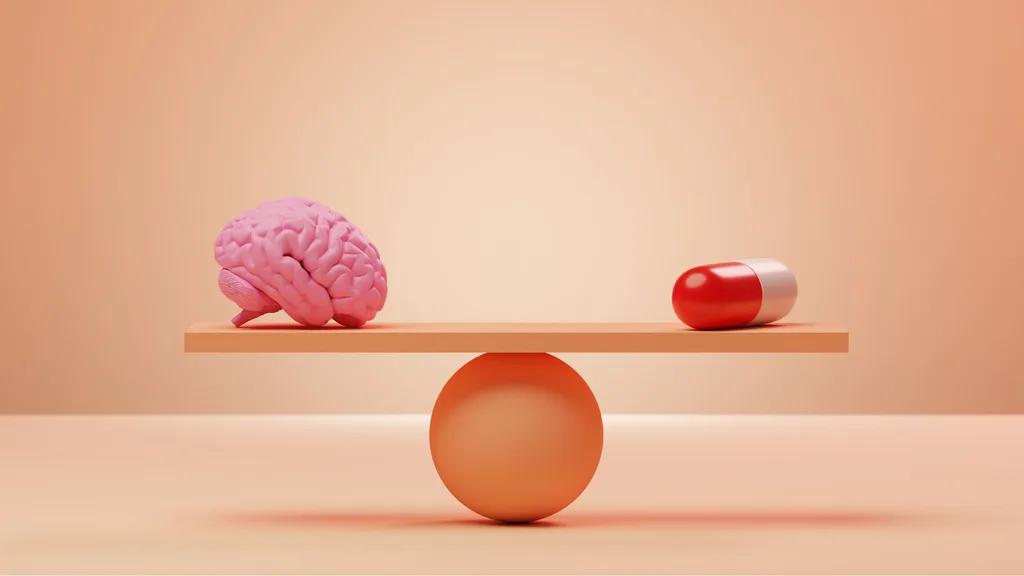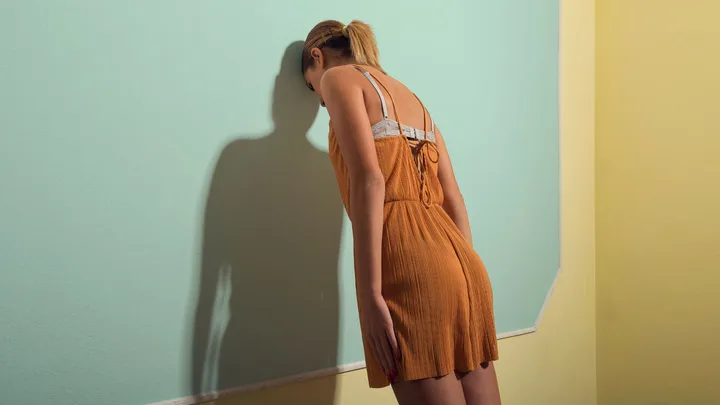Health anxiety, or Illness Anxiety Disorder as it’s otherwise known, is on the rise, fuelled by Dr Google, extreme wellness culture and medical gaslighting. And women, writes Kathryn Madden, are bearing the pain.
For Philippa, 42, it started with a spot. A brown speck on her left forearm that was barely bigger than a pinhead, but loomed large in her mind. She’d trace it with her finger, its jagged form
gnawing at her conscience.
“I’d never paid much attention to spots on my skin, and I wasn’t one to look up that kind of thing online, but for some reason this was different,” she remembers. “I jumped to the worst possible conclusion and decided it was melanoma, that I had cancer.”
Her internet search history filled with medical jargon and morbid outcomes; her heart filled with fears for her two young sons when she was gone.
Mentally she planned her funeral and updated her will. “After two weeks of worrying, I went to the doctor and immediately got the all-clear. It assuaged my anxiety, until a few months later when I heard a woman with terminal ovarian cancer on the radio.
Within hours, I felt pain in my ovaries and became really stressed and went for a scan. Another time, one of my husband’s work colleagues died from a rare jawbone cancer.
I ran my tongue around my mouth, and the bones above my teeth just felt strange. I nervously went to the dentist, convinced she would tell me that something wasn’t right and that I needed to see a doctor. I spent a good two years fixating on my health.”
What Is Illness Anxiety Disorder?

Illness anxiety disorder, commonly known as health anxiety, is a mental health condition characterised by a persistent or unwarranted preoccupation with having or developing a serious illness. It spans from fleeting worries – a split-second flash that your headache could be a brain tumour – to debilitating, all-consuming panic.
It might extend to concerns about the health of family members, and can manifest in excessive self-examination and reassurance-seeking, or in avoiding health issues and medical visits altogether.
Either way, it appears to be on the rise. An estimated 5.7 per cent of Australians live with health anxiety, though this figure is likely much larger given gaps in research and difficulty measuring the condition.
Mental health experts interviewed for this story say they’ve observed an anecdotal rise in both health anxiety and generalised anxiety, with statistics showing that 21.1 per cent of Australian women and 13.3 per cent of Australian men experienced a 12-month anxiety disorder between 2020 and 2022.
“Women tend to report more anxiety, broadly speaking, so women are also more likely to be diagnosed with health anxiety,” explains Dr Rachel Menzies, clinical psychologist and founder of Menzies Anxiety Centre.
“Whether that’s because women are more likely to recognise it and seek treatment or because women are inherently more predisposed to anxiety is a bigger question.”
What Is The Root Cause Of Health Anxiety?
The prevalence of health anxiety right now can be linked to several factors. Covid saw the world home in on health data and hand-washing like never before, triggering newfound neuroses for some. Conversely, many long-time health pandemic and the sense that, for the first time, they weren’t alone in their angst.
“I largely found the experience oddly calming,” wrote Caroline Crampton in her new memoir cum-cultural history of health anxiety, A Body Made of Glass. “Other hypochondriacs I have spoken to confirmed that they experienced this contradictory reaction too … We were no longer the outliers with our irrational fears and our imaginary illnesses … Suddenly we were normal.”
Since then, society’s fixation on wellbeing has continued to swell. When the trillion-dollar global wellness industry promises you that by downing daily supplements, tracking your heart rate and biohacking like the tech bros, you too can unlock perfect health, it’s not surprising we’re becoming obsessed.
And when life feels shrouded in doom and gloom, weighed down by the incomprehensible state of the world or one’s own interior experience, health issues might provide something more tangible to focus on. Philippa traces her anxiety back to an intensely shaky time in her life.
“Someone who feels they need to have complete control of their health will be more prone to health anxiety”
Dr Rachel Menzies
She’d just had her second baby, who was two months old, when her mum was diagnosed with secondary cancer.
“I think I was already dealing with some postnatal depression, and then that news flipped a switch in terms of what I understood to be possible,” she shares. “The anxiety just ran away from me.”
Six weeks later Philippa found out that her mum had been misdiagnosed, but her hyper-fixation continued for a few years. “Perhaps it balanced out when my hormones calmed down, I’m not sure. Now I would never bother looking up a symptom on the internet because I know that could be dangerous, but I’m also not that interested. I guess I’ve got trust back in my body.”
Reflecting on that period of high anxiety, she’s realised it was also partly rooted in her role as a caregiver. “I would have moments where I’d think if I am sick and have something very wrong with me, people will have to start looking after me.
I’m not saying that I wasn’t being looked after at that time, but it’s what I was feeling, probably related to my mum being sick and me being a new mother. There are layers that I’ll probably never fully entangle.”
Philippa admits she never spoke to her partner or friends about her worries for fear of burdening them. Others stay quiet because they’re afraid of appearing delusional, dramatic or self-indulgent.
Health Anxiety Or Hypochondria?

Before illness anxiety disorder entered the medical books, it was known as hypochondria. Today, that term is considered pejorative in medical circles, perhaps because of its long
history linked to neurotic and nervy overthinkers like Proust, Charlotte Brontë and Andy Warhol.
It was a disease of eccentrics and creatives rather than a legitimate mental disorder, a connotation that persists to some degree today. Chantelle Catalan-Cox, 30, has fretted about health since the age of five – every bulge, bump, lump and twinge a dark omen, the mirror her tool for compulsive analysis.
“I was always very aware of things that were on my body; the tiniest mark could start a full-blown panic attack. And I would worry about my family if they were just slightly unwell,” she recalls.
“But I always kind of dismissed it because my family would tell me, you’re just a nervous person, you’ll be fine. They don’t really believe in mental health issues, so nobody ever suggested I might need some therapy to talk through my worries.”
At her worst, she was seeing a doctor every fortnight and funnelling thousands of dollars into appointments and tests. (Health anxiety can be a huge financial burden. It’s typically
more prevalent in prosperous countries, though a 2022 medical study found it to be more common in people of low socioeconomic status, as are most health conditions.)
It was only when Catalan-Cox met her now-wife that she realised “not everyone feels like this” and started seeing a psychologist. “We’ve worked a lot on challenging my thoughts,” she says of her ongoing cognitive behavioural therapy.
“Meditation and breathing exercises don’t work that well for me because I have ADHD, so my brain is super-fast all the time. But I’ve learnt to step back and do a reality check before I spiral … I recognise that this may never go away, but I’ve found some techniques that help me manage the severity of the way my body reacts to triggers and thoughts that pop into my head. And I recognise it for what it is: a mental illness.”
Much of the discourse about health anxiety and hypochondria is rooted in its irrationality. But what happens when illness anxiety disorder and real, diagnosable illness collide?
Imogen Kars, 29, was 12 when she inexplicably lost sight in her right eye, and spent the next decade in and out of hospital. Slowly she was diagnosed with intracranial hypertension, rheumatoid
arthritis, chronic viral conditions and carpal tunnel syndrome.
“Along the way I developed some pretty gnarly health anxiety,” says Kars. “Once, I was watching TV and thought I was having a heart attack. When I had allergy flare-ups I’d feel like I couldn’t breathe. For a good six months I thought I had lung cancer … It’s tricky because I’ve had very real symptoms and very real conditions that I’ve been to the doctors about, and I’ve been dismissed and not given the appropriate care. Then I went to the doctor [for physical concerns] that I sensed were probably anxiety, and I still didn’t get that attention. It’s a mindfuck. It almost makes you feel like you can’t trust what you’re experiencing.”
Therein lies the complexity of health anxiety. Studies have repeatedly shown that women’s pain (and the pain of other marginalised groups) is underestimated. Medical gaslighting leaves individuals losing trust in their bodies a recipe for panic and distress that may have fatal consequences.
One source for this story shared that an unwell friend was told by doctors time and time again that “it’s all in your head”, until she was ultimately diagnosed with terminal cancer.
What Is The Best Therapy For Illness Anxiety Disorder?

Menzies says that compassionate care is critical when treating health anxiety.
“As psychologists, we say, you’re taking appropriate action, you’ve seen a doctor, you’ve got the tests, is there actually anything more that can be done? It’s not to say that it’s always in someone’s head and that there can’t be a biological cause for what they’re experiencing, it’s about trying to help them live with those worries, be less distressed and face it in a more balanced manner.”
Monitoring one’s health is, after all, only natural. It evolved millennia ago as a human survival skill, alongside identifying potential threats. And when the threat of disease and
death is seemingly all around, physical symptoms or sensations may start to manifest.
Consider “medical student syndrome”, a phenomenon that sees aspiring physicians believe they’ve contracted the disease they’re studying, or psychosomatic lice that make your scalp tingle and itch. In due course, there’ll be a term for the tight chest you feel after glancing at the medical data flashing on your wrist.
Kars, however, refrains from studying smartwatches and fitness trackers.
“I think they’re really bad for people with health anxiety. They disconnect us further from our bodily says. A few years ago, Kars found physical and mental healing in Ayurveda, an ancient Indian medical system centred on balancing the mind, body and consciousness.
“Modern medicine is so important, but we’ve given a lot of our power away to other people when we actually know what’s going on in our own bodies. Ayurveda has helped me understand and trust my body. I now feel safe in my body again, and that my body isn’t trying to harm me.”
Regaining a sense of agency is game-changing for health anxiety sufferers, though relinquishing some control can be too.
Women often feel a huge and unwarranted responsibility to be on the front foot when it comes to their health – and their family’s health – and perfectionists in particular will go to extreme lengths to avoid illness and the guilt that accompanies it.
“Someone who feels they need to have complete control of their health, of their body, of their life will be more prone to health anxiety, or find it more challenging,” affirms Menzies.
Sitting with uncertainty and discomfort are skills that are slowly dying in our quick-click, instant-gratification society. But ultimately, and paradoxically, they might
provide the comfort that so many crave.
As health anxiety sufferer Crampton wrote in her memoir, “[I need to] accept that I have no control over what happens to me or inside me, that my billions of cells do not work to my command or even for my attention.
No amount of hypervigilance to my body’s activities or change will alert me to the fact that something has gone wrong earlier. I cannot study harder, or do better, or improve at this. It is merely a fact of being alive. And this is a very uncomfortable realisation.”
How To Manage Internal Voices And Whirling Doubts?
Should I go to Dr Google with my symptoms?
Dr Rachel Menzies: “With caution. The conflicting information on the internet can be a recipe for anxiety: one news article says wine protects from cancer, another says wine causes cancer.”
How do I know when I should seek professional help?
RM: “When the anxiety is getting in the way of you doing things or pursuing goals. You might find it hard to relax in the evenings because you’re fixating on health, or you might change the channel when something comes on the TV about cancer. And if you start to feel like your anxiety about health is above and beyond what the people around you experience, it’s worth seeking professional help.”
What are the common professional treatments for health anxiety?
RM: “Cognitive Behavioural Therapy [CBT] is a commonly used and evidence-based treatment for health anxiety. Psychologists may also use other therapeutic techniques such as mindfulness or relaxation training in order to help a person manage their anxiety. Medications such as SSRIs may also be prescribed by a medical doctor or psychiatrist.”
What does CBT involve?
RM: “CBT works to identify and challenge the unhelpful beliefs or thoughts that are causing the anxiety. It’s getting people to face their fears, not focus on their body, and essentially do the
opposite of what their anxiety is telling them to do.”
Are care-seeking and care-avoidant health anxiety treated differently?
RM: “Yes. For the person who is constantly at the doctors, we want them to get better at resisting that urge to seek reassurance. With the person who is avoiding, we want them to work towards being able to seek care when appropriate. We want them to be reading about and exposing themselves to [information about] illness.”
Could my smartwatch be adding to my health anxiety?
RM: “We often find people with health anxiety hyper-focusing on their smart watch – their heart rate and their sleep. If they’re using this to manage their anxiety, we work with them towards not wearing that device.”’
How can I support a loved one with health anxiety?
RM: “You want to validate that they’re very anxious but limit the amount of reassurance that you are giving – because the reassurance is never enough, and the more you reassure, the more it’s feeding the cycle. This is a lot easier to do when someone is working with a psychologist and learning other strategies so that they’re not relying on that reassurance from a family member.”
 Getty Images
Getty Images


